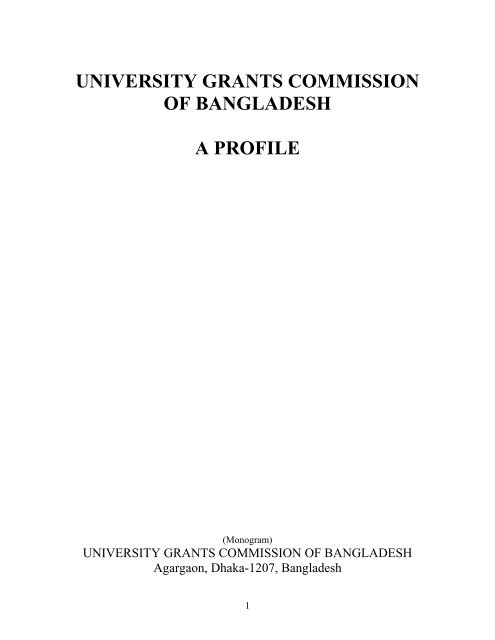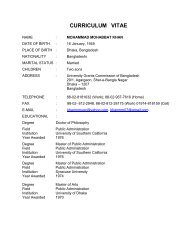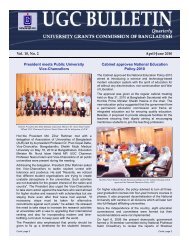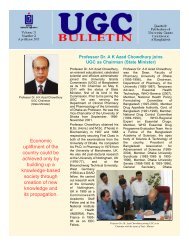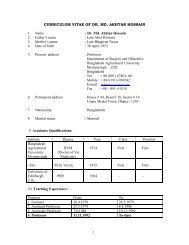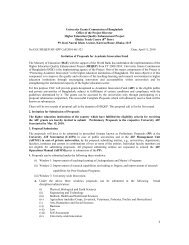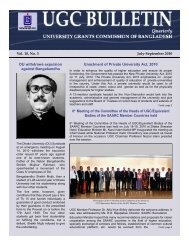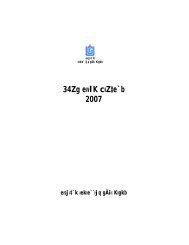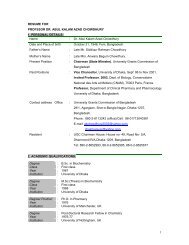Brochure - University Grants Commission of Bangladesh
Brochure - University Grants Commission of Bangladesh
Brochure - University Grants Commission of Bangladesh
Create successful ePaper yourself
Turn your PDF publications into a flip-book with our unique Google optimized e-Paper software.
UNIVERSITY GRANTS COMMISSION<br />
OF BANGLADESH<br />
A PROFILE<br />
(Monogram)<br />
UNIVERSITY GRANTS COMMISSION OF BANGLADESH<br />
Agargaon, Dhaka-1207, <strong>Bangladesh</strong><br />
1
Published by :<br />
The <strong>University</strong> <strong>Grants</strong> <strong>Commission</strong> <strong>of</strong> <strong>Bangladesh</strong><br />
Agargaon, Dhaka-1207<br />
UGC Pub. No.<br />
January 2008<br />
ISBN :<br />
Editorial Board: Pr<strong>of</strong>essor Dr. A H M Zehadul Karim Chief Editor<br />
Pr<strong>of</strong>essor Dr. Ehsanul Haq<br />
Editor<br />
Pr<strong>of</strong>essor Dr. Md. Abdul Hakim<br />
Editor<br />
Pr<strong>of</strong>essor Dr. Tazul Islam<br />
Editor<br />
Pr<strong>of</strong>essor Dr., Amena Begum<br />
Editor<br />
Dr. Md. Lute Alam<br />
Editor<br />
Member-Secretary<br />
Compiled by : Fakrul Islam<br />
Assistant Director (Publication)<br />
Assisted by : Md. Liakat Hossain<br />
Section Officer (Pub)<br />
Compose by : Md. Mamun-Or-Rashid<br />
Computer Operator (Pub)<br />
Printed by:<br />
2
FOREWORD<br />
This pr<strong>of</strong>ile <strong>of</strong> the Universities <strong>Grants</strong> <strong>Commission</strong> <strong>of</strong> <strong>Bangladesh</strong> has been published to<br />
provide very briefly the information relating to the UGC. The pr<strong>of</strong>ile has introduced , the<br />
readers with structural composition <strong>of</strong> the UGC and has incorporated division wise<br />
functions <strong>of</strong> it in different levels. The Research Division <strong>of</strong> the <strong>University</strong> <strong>Grants</strong><br />
<strong>Commission</strong> has taken special effort for the publication. I gratefully acknowledge their<br />
sincere assisted and cooperation in this regard.<br />
I hope that this pr<strong>of</strong>ile will be useful to those who are keenly interested in the activities <strong>of</strong><br />
UGC.<br />
Pr<strong>of</strong>essor Nazrul Islam<br />
Chairman<br />
<strong>University</strong> <strong>Grants</strong> <strong>Commission</strong> <strong>of</strong> <strong>Bangladesh</strong><br />
3
CONTENTS<br />
Foreword<br />
1. Background<br />
2. Composition<br />
3. Role<br />
4. Functions<br />
5. Structural Pr<strong>of</strong>ile <strong>of</strong> the UGC<br />
6. Secretariat<br />
7. Finance & Accounts<br />
8. Research & Publication<br />
9. Planning & Development<br />
10. Private <strong>University</strong><br />
11. Training and Instrumentation<br />
Appendices<br />
1. The President Order No. 10 <strong>of</strong> 1973<br />
2. Fulltime Chairman & Members <strong>of</strong> the <strong>Commission</strong><br />
3. The Finance Committee<br />
4. The Public Universities<br />
5. The Private Universities<br />
4
UNIVERSITY GRANTS COMMISSION OF BANGLADESH<br />
1. Background:<br />
The <strong>University</strong> <strong>Grants</strong> <strong>Commission</strong> (UGC) <strong>of</strong> <strong>Bangladesh</strong> was established under the<br />
President’s Order (P.O.) No. 10 <strong>of</strong> 1973 which was deemed to have come into force with<br />
effect from 16 December 1972.<br />
The UGC is the apex and statutory body <strong>of</strong> the universities <strong>of</strong> <strong>Bangladesh</strong> including the<br />
private universities. The primary objectives <strong>of</strong> instituting the UGC were to promote and<br />
coordinate university education; monitor, and maintain standard <strong>of</strong> university education;<br />
assess the needs in terms <strong>of</strong> funding for the public universities; and advise the<br />
Government on various issues related to the universities. The arrangement was also<br />
designed to safeguard the autonomous character <strong>of</strong> the universities.<br />
Composition<br />
Under section 4(I) <strong>of</strong> the President’s Order No. 10 <strong>of</strong> 1973 and its amendment <strong>of</strong> 1998<br />
the UGC consists <strong>of</strong> the following members:<br />
Chairman : 1<br />
Full-time Members : 5<br />
Part-time Members : 9<br />
The Part-time members embody three Vice-Chancellors by rotation, three Pr<strong>of</strong>essors <strong>of</strong><br />
the Universities (<strong>of</strong> which the Vice-Chancellors are not members), and three nominees <strong>of</strong><br />
the Government (Secretary, Ministry <strong>of</strong> Education, relevant Member <strong>of</strong> the Planning<br />
<strong>Commission</strong>, and a representative <strong>of</strong> the Ministry <strong>of</strong> Finance, not below the rank <strong>of</strong> a<br />
Secretary).<br />
3. Role:<br />
The basic principle on which the UGC <strong>of</strong> <strong>Bangladesh</strong>, like its counterparts elsewhere in<br />
the world, has been instituted is that it shall deal with the Government, specially with the<br />
Ministry <strong>of</strong> Education, on behalf <strong>of</strong> the universities <strong>of</strong> <strong>Bangladesh</strong>.<br />
The major responsibilities entrusted to the UGC by the President’s Order No. 10 <strong>of</strong> 1973<br />
are to receive funds from the Government and allocate and disburse, out <strong>of</strong> such funds,<br />
grants to the public universities for their maintenance and development. After necessary<br />
assessment and scrutiny <strong>of</strong> the requirements <strong>of</strong> the universities, the UGC places them<br />
before the Government for necessary approval. Till now, the UGC, however, does not<br />
deal with the financial affairs <strong>of</strong> private universities, but is authorized to supervise,<br />
monitor and regulate their activities. The UGC performs the arduous task <strong>of</strong> convincing<br />
the Government about the needs <strong>of</strong> the universities and thus work as a coordinating body<br />
between the Government and the universities. The arrangement safeguards the<br />
universities from undue political interference and helps the Government to avoid undue<br />
pressure in dealing directly with the universities.<br />
The framing <strong>of</strong> Education Policy <strong>of</strong> the country is the responsibility <strong>of</strong> the Government.<br />
The UGC, along with other relevant bodies, provides necessary materials for framing the<br />
5
policy. Within the framework <strong>of</strong> the national policy, the UGC is free to deal with the<br />
promotion and development <strong>of</strong> higher education and research in all fields..<br />
Relation with the Universities: The Universities do not deal directly with the<br />
government for their needs but with the <strong>University</strong> <strong>Grants</strong> <strong>Commission</strong> which in turn<br />
deals with the government on their behalf. The primary function <strong>of</strong> the <strong>University</strong> <strong>Grants</strong><br />
<strong>Commission</strong> <strong>of</strong> <strong>Bangladesh</strong> is to protect and safeguard the academic and administrative<br />
autonomy <strong>of</strong> the universities. The UGC analyses the needs and demands <strong>of</strong> the<br />
universities and examines the various programmers <strong>of</strong> the universities including those for<br />
expansion.<br />
The UGC acts as a spokesman and regulatory body for the universities and plays a<br />
pivotal role in presenting the problems and demands <strong>of</strong> the universities to the<br />
Government.<br />
Relation with the Government: The statutory obligation <strong>of</strong> the <strong>University</strong> <strong>Grants</strong><br />
<strong>Commission</strong> to the Parliament emanates from the President’s Order No. 10 <strong>of</strong> 1973. As<br />
per section 12 <strong>of</strong> the Order, the <strong>Commission</strong> shall prepare a report not later than the first<br />
day <strong>of</strong> March each year, on the activities and performances <strong>of</strong> the universities for the year<br />
ending on the previous thirty-first day <strong>of</strong> December and submit it to the Government for<br />
its appraisal. The Government shall cause the report to be laid before the Parliament.<br />
Further, as per section 11 <strong>of</strong> the Order “the <strong>Commission</strong> shall cause to be maintained<br />
such books <strong>of</strong> account and other books in relation to its account in such form and in such<br />
manner as may, in consultation with the Comptroller and Auditor General <strong>of</strong><br />
<strong>Bangladesh</strong>..., be prescribed”.<br />
Relation with the Parliament The constitutional obligation <strong>of</strong> the <strong>University</strong> <strong>Grants</strong><br />
<strong>Commission</strong> <strong>of</strong> <strong>Bangladesh</strong> to the Parliament has been laid down by President's Order<br />
No. 10 <strong>of</strong> 1973 [(Section 11(1), (2), (3) and (4)]. Each year the UGC submits an Annual<br />
Report to the National Parliament through the Ministry <strong>of</strong> Education along with<br />
recommendations to enhance the quality <strong>of</strong> education in the country.<br />
This also includes annual accounts <strong>of</strong> the <strong>Commission</strong> together with the audit report<br />
thereon.<br />
4. Functions:<br />
Functions<br />
Under section 5(I) <strong>of</strong> the President’s Order, the UGC’s functions broadly fall into two<br />
categories: Academic and Financial.<br />
Academic Functions<br />
• To assess the needs in the field <strong>of</strong> university education and formulate plans for the<br />
development <strong>of</strong> such education;<br />
• to examine and assess the quality and standard <strong>of</strong> teaching and research in various<br />
disciplines at the university level education;<br />
6
• to collect statistical data and other information relating to the existing situation in<br />
the field <strong>of</strong> higher education;<br />
• to advise the Government on proposals to grant the right to confer special degree<br />
awarding status on colleges which may be considered suitable for such other<br />
functions as may be conferred on it by any law or by the Government.<br />
• to examine in depth the facilities available for students and formulation <strong>of</strong> plans for<br />
their upliftment;<br />
• to provide facilities for expansion and improvement <strong>of</strong> the standard <strong>of</strong> higher<br />
education by promoting fundamental and empirical research in the universities and<br />
affiliated colleges;<br />
• to improve facilities and opportunities for teachers relating to higher studies,<br />
research and training both at home and abroad; and<br />
• to examine possibilities for raising individual colleges to autonomous status and<br />
expansion and establishment <strong>of</strong> new universities and research institutions.<br />
• to deal with the academic aspects <strong>of</strong> the private universities and assisting them to<br />
develop their curriculum.<br />
B. Financial Functions<br />
The Government after due appropriation made under law in this regard pay to the UGC in<br />
each financial year such sums as may be feasible for the maintenance and development <strong>of</strong><br />
the universities or for the promotion <strong>of</strong> higher education and research and for the purpose<br />
<strong>of</strong> all other functions <strong>of</strong> the UGC under this Order.<br />
Sources <strong>of</strong> the UGC fund are as follows :<br />
• <strong>Grants</strong> from the Government;<br />
• Loans from the Government;<br />
• Donations and Endowments; and<br />
• Receipts from such other sources as may be approved by the Government.<br />
Financial functions involve :<br />
• determining financial needs <strong>of</strong> the public universities;<br />
• receiving funds from the Government and allocate and disburse, out <strong>of</strong> such funds,<br />
grants to the universities for their maintenance and development;<br />
• making budgetary allocations for the universities;<br />
• drawing budgeted fund from the Government Exchequer in four quarterly<br />
installments and disburse it to the public universities;<br />
• formulating development plan for the public universities;<br />
• formulating Annual Development Programme (ADP) & Annual Foreign Exchange<br />
Budget (AFEB) for the public universities;<br />
• monitoring and evaluating the development projects undertaken by the public<br />
universities;<br />
• providing funds for the research projects proposed by the university teachers;<br />
• <strong>of</strong>fering and allocating funds for the UGC M.Phil & Ph.D Fellowship;<br />
• allocating and disbursing money from the research support fund to assist the higher<br />
education and research;<br />
• allocating fund and processing UGC Awards, UGC Merit Awards, UGC Chair etc.;<br />
• allocating fund for publishing graduate and post graduate text & reference books;<br />
7
• giving partial travel grants to the university teachers to participate in seminar,<br />
symposium and conference; and<br />
• granting financial assistance to such other higher education and research activities.<br />
Recurrent <strong>Grants</strong>: These grants are allocated to meet the expenditure on staff salaries,<br />
running costs <strong>of</strong> departments, libraries, laboratories, maintenance <strong>of</strong> premises and so on.<br />
Recurrent Expenditure – The public universities shall submit their budget to the UGC<br />
according to the calendar agreed upon by the UGC and the universities. These will be<br />
discussed, scrutinized and examined in detail by the UGC <strong>of</strong>ficials and their university<br />
counterparts. There will be constant exchange <strong>of</strong> views between the UGC and the public<br />
universities through their respective <strong>of</strong>ficials to clarify and remove all possible<br />
confusions and ambiguity. There may be discussion between the Chairman and the<br />
Members <strong>of</strong> the UGC with the Vice-Chancellors <strong>of</strong> the public universities. After this, the<br />
UGC will examine the budget proposal <strong>of</strong> each public university. At the second stage, the<br />
UGC <strong>of</strong>ficials will discuss the budget with the <strong>of</strong>ficials <strong>of</strong> the Ministry <strong>of</strong> Education, and<br />
those <strong>of</strong> the Ministry <strong>of</strong> Finance. At the ending stage, the UGC will present the budget <strong>of</strong><br />
the public universities to the Ministry <strong>of</strong> Education.<br />
Development <strong>Grants</strong>: These are given for five specific purposes:<br />
(i)<br />
(ii)<br />
(iii)<br />
(iv)<br />
(v)<br />
erection <strong>of</strong> new buildings and adaptation <strong>of</strong> the old ones for various purposes,<br />
academic and residential;<br />
purchase <strong>of</strong> sites, properties and lands;<br />
pr<strong>of</strong>essional fees;<br />
furnishing <strong>of</strong> buildings;<br />
new academic departments.<br />
Development Expenditure – The public universities shall submit their development<br />
plans to the UGC and the UGC will process it for the approval <strong>of</strong> the appropriate<br />
authority.<br />
(i)<br />
(ii)<br />
(iii)<br />
The Chairman, Members and Officials <strong>of</strong> the UGC shall visit the public<br />
universities and discuss their development plans with the <strong>University</strong> authorities on<br />
the spot.<br />
The UGC shall be constantly in touch with the Ministry <strong>of</strong> Education and the<br />
Planning <strong>Commission</strong>. The final decision about the overall size <strong>of</strong> the fund is the<br />
responsibility <strong>of</strong> the Government, and once the decision is made, the distribution<br />
<strong>of</strong> the available funds is the exclusive responsibility <strong>of</strong> the UGC.<br />
The Annual Development <strong>of</strong> Plan (ADP) <strong>of</strong> each public university is to be<br />
prepared in the light <strong>of</strong> the amount <strong>of</strong> fund made available for each public<br />
university in the fiscal year.<br />
8
5. Structural Pr<strong>of</strong>ile <strong>of</strong> the UGC<br />
Structurally, the UGC consists <strong>of</strong> the <strong>of</strong>fice <strong>of</strong> the Chairman, the <strong>of</strong>fices <strong>of</strong> the Full-time<br />
Members, the <strong>of</strong>fices <strong>of</strong> Six Divisions.<br />
The main functions <strong>of</strong> the Administrative Division are to provide Secretariat and General<br />
Services to the UGC, and handle the scholarships and fellowships <strong>of</strong>fered and processed<br />
by the UGC.<br />
The principal role <strong>of</strong> the Finance and Accounts Division is to manage the financial affairs<br />
<strong>of</strong> the UGC at micro-level and help the public universities at macro-level in respect <strong>of</strong><br />
coordination and control <strong>of</strong> revenue and expenditures and also to assist the UGC in its<br />
strategic financial decision making processes.<br />
The Research and Publication Division <strong>of</strong> the UGC promotes and enhances higher<br />
education through research activities <strong>of</strong>fering regular research projects to the university<br />
teachers, arranging seminars, symposia and workshops on higher education in the<br />
country. It <strong>of</strong>fers support fund to the university teachers, researchers and fellows to attend<br />
in the seminar, workshop and symposia abroad. It publishes the annual report, five year<br />
report, research reports and also textbooks at the tertiary level. UGC Book Publication<br />
Committee promotes reference, translation and textbook at the tertiary level to enhance<br />
and expedite high quality education. The UGC is maintaing a reference library and<br />
archive for its own and spreading its function towards the universities as a central<br />
reference library.<br />
The Planning and Development Division formulate and implement plan for overall<br />
development <strong>of</strong> the university education <strong>of</strong> the country. This division is responsible for<br />
the planning and establishment <strong>of</strong> the <strong>University</strong> Resource Center and the <strong>Bangladesh</strong><br />
Education and Research Network in the premises <strong>of</strong> the UGC and also to oversee proper<br />
and timely implementation <strong>of</strong> the new scheme for public universities.<br />
The main role <strong>of</strong> Private <strong>University</strong> Division is to cater the need <strong>of</strong> gradually increasing<br />
large number <strong>of</strong> students aspiring higher education by establishing private universities in<br />
<strong>Bangladesh</strong>. Among others, another prime function <strong>of</strong> this division is to ensure quality<br />
education in private universities through monitoring, supervising and inspecting various<br />
activities <strong>of</strong> private universities for rectification and improvement. It also advises the<br />
government for formulating appropriate policies regarding higher education in the private<br />
sector if and when it is required.<br />
The role <strong>of</strong> the Training and Instrumentation Division is to organize training courses for<br />
scientific instrumentation specially by arranging certificate, diploma, post diploma and<br />
training courses on scientific instrumentation.<br />
9
Secretariat<br />
The role and functions <strong>of</strong> the Secretariat and Administrative Services Division are to give<br />
secretariat and general services to the UGC. There are three sections under this division.<br />
The activities & functions <strong>of</strong> these sections are outlined below.<br />
1. Administrative Services Section: The function <strong>of</strong> the administrative services section<br />
are as follows :<br />
(a) Personnel Matters:<br />
• maintain personal files and records <strong>of</strong> the employees <strong>of</strong> the <strong>Commission</strong>;<br />
• prepare and maintain complete lists/statements <strong>of</strong> the employees and provide<br />
necessary information to the authority/ministry as per requirement;<br />
• maintain files <strong>of</strong> all kinds <strong>of</strong> leave, increments, seniority list and pay anomalies <strong>of</strong> the<br />
employees <strong>of</strong> the <strong>Commission</strong>.<br />
• settle cases <strong>of</strong> retirement and pension benefits <strong>of</strong> the employees;<br />
• initiate, process and settle cases <strong>of</strong> disciplinary action;<br />
• collect information and prepare replies to the questions <strong>of</strong> the National Assembly and<br />
submit the same to the Ministry <strong>of</strong> Education as per need;<br />
• maintain files <strong>of</strong> Annual Confidential Report (ACR) <strong>of</strong> the employees <strong>of</strong> the<br />
<strong>Commission</strong>;<br />
• maintain liaison with the government, universities and other govt. and semi-govt.<br />
organizations on different matters/issues;<br />
• maintain liaison with Government, Universities and other organization;<br />
• perform duties in respect <strong>of</strong> establishment <strong>of</strong> Private Universities;<br />
• process all leave applications such as casual leave, earned leave, maternity leave, Ex-<br />
<strong>Bangladesh</strong> leave etc., get approval from the authority and issue necessary <strong>of</strong>fice<br />
orders relating to such leaves, maintain records <strong>of</strong> all type <strong>of</strong> leaves;<br />
• frame Rules/Regulations/Statutes etc. <strong>of</strong> the UGC and the Universities under the<br />
guidance <strong>of</strong> the UGC;<br />
• perform the functions in respect <strong>of</strong> creation <strong>of</strong> posts, recruitment, promotion,<br />
up-gradation etc;<br />
• recommend Time-Scale, Selection Grade Scale to the employees;<br />
10
. Security Matter:<br />
• prepare appropriate duty roster for the security personnels and deploy them prudently<br />
at different important points/places for maintaining overall security at the UGC Bhaban<br />
and the <strong>of</strong>fice-cum Residence building at Dhanmondi R/A, Dhaka.<br />
c. Bilateral Exchange Programme:<br />
• discharge duties in respect <strong>of</strong> JSPS -UGC joint research project and the RONPAKU<br />
(Dissertation Ph.D) programmes under the memorandum <strong>of</strong> understanding (MOU)<br />
signed between the two organizations, the UGC <strong>of</strong> <strong>Bangladesh</strong> and the JSPS (Japan<br />
Society for the Promotion <strong>of</strong> Science) <strong>of</strong> Japan.<br />
2. General Services Section : The role and functions <strong>of</strong> the General Services section<br />
are to provide general services to the UGC. The activities and functions <strong>of</strong> this<br />
section are outlined below:<br />
a. Transport:<br />
• discharge duties in respect <strong>of</strong> transportation and route management <strong>of</strong> all the<br />
employees <strong>of</strong> the <strong>Commission</strong>.<br />
• discharge duties in respect <strong>of</strong> maintenance <strong>of</strong> log books, tax-token, fitness and<br />
insurance papers <strong>of</strong> the <strong>of</strong>fice vehicles;<br />
• discharge duties in respect <strong>of</strong> procurement, maintenance and preservation <strong>of</strong> <strong>of</strong>fice<br />
vehicles.<br />
b. Support Services:<br />
• arrange purchase and procurements <strong>of</strong> <strong>of</strong>fice logistics.<br />
• perform duties with regard to all sorts <strong>of</strong> repairing and maintenance works <strong>of</strong> the<br />
<strong>Commission</strong>’s asset and properties such as <strong>of</strong>fice equipment’s / machinery, electrical<br />
and electronic items, furniture-fixtures, land and buildings etc. and maintain records<br />
<strong>of</strong> commission’s property;<br />
• procure liveries for the class 3 and 4 employees <strong>of</strong> the commission;<br />
• allocate <strong>of</strong>fice room <strong>of</strong> the <strong>of</strong>ficers and staff <strong>of</strong> the <strong>Commission</strong>;<br />
• maintenance <strong>of</strong> generator and power station <strong>of</strong> <strong>of</strong>fice building;<br />
• procurement and distribution <strong>of</strong> stationery items;<br />
11
• all related works <strong>of</strong> store <strong>of</strong> the UGC;<br />
• entertain complaints with regard to supply <strong>of</strong> water, electricity, gas and<br />
telecommunication services and take measures to bringing them to order.<br />
• arrange payments <strong>of</strong> bills <strong>of</strong> all the utility services like electricity, water, gas and<br />
telephones <strong>of</strong> the commission;<br />
• discharge duties with regard to the matter <strong>of</strong> municipality taxes in respect to land and<br />
buildings <strong>of</strong> the commission.<br />
3. Fellowship and Scholarship:<br />
The function <strong>of</strong> the Fellowship & Scholarship section are as follows :<br />
• perform functions relevant to UGC Fellowships for M.Phil and Ph.D programmes;<br />
• maintain and process Commonwealth and other Scholarships and Fellowships<br />
(Canada, England, New Zealand, Malaysia, India etc.) and other international<br />
scholarships and fellowships (Dad, IDB, Matsumi, Pakistan, Nepal etc.);<br />
• maintain and process UNESCO, DFID and other awards/training programme;<br />
• collect information regarding studies abroad;<br />
• perform functions relevant to SAARC Chair, SAARC Fellowship and SAARC<br />
Games, SAARC Debate, Center <strong>of</strong> Excellence;<br />
• arrange nomination for seminar, conference, workshop etc. <strong>of</strong> various agencies<br />
abroad;<br />
• institutional capacity grants;<br />
• perform academic responsibilities including equivalence <strong>of</strong> degrees, determination <strong>of</strong><br />
examination remuneration etc;<br />
• UGC Pr<strong>of</strong>essorships;<br />
• process local & foreign training <strong>of</strong> the <strong>of</strong>ficers and staff <strong>of</strong> the <strong>Commission</strong>.<br />
• perform other duties assigned by the authority;<br />
12
Activities <strong>of</strong> the State Sub-Division :<br />
• maintenance <strong>of</strong> UGC Bhaban and UGC residential area;<br />
• maintenance <strong>of</strong> the residences/ houses <strong>of</strong> Chairman and Members;<br />
• maintenance <strong>of</strong> electricity, water and gas lines <strong>of</strong> UGC Bhaban, UGC residential<br />
area; Chairman and Members Bhaban;<br />
• collection and payment <strong>of</strong> municipal and other bills;<br />
• allocation <strong>of</strong> houses at the UGC staff quarter.<br />
Composition: The Secretariat and Administrative Services Division is headed by a full<br />
time Secretary who is assisted by Joint-Secretary, Deputy Secretaries, Assistant<br />
Secretaries, Medical Officer and a number <strong>of</strong> other <strong>of</strong>ficers and staff.<br />
13
Finance and Accounts Division<br />
The role and functions <strong>of</strong> the Finance & Accounts Division are to oversee the<br />
management <strong>of</strong> the Financial affairs <strong>of</strong> the Public Universities in respect <strong>of</strong> revenue<br />
income and expenditure and also to assists the UGC in its financial decision making<br />
processes.<br />
The main functions <strong>of</strong> the Finance & Accounts Division are as follows:<br />
• assess the financial needs <strong>of</strong> the Public Universities and help the management <strong>of</strong> fund<br />
<strong>of</strong> these institutions;<br />
• visit the universities and hold meeting and also group discussions with the concerned<br />
<strong>of</strong>ficial <strong>of</strong> the universities;<br />
• examine the financial aspects <strong>of</strong> the universities to ensure that the funds provided by<br />
the government are spent for the purposes for which these are earmarked.<br />
• scrutinize intensively and critically the revenue budgets <strong>of</strong> the universities and the<br />
UGC and other specific financial proposals and recommendations, which are<br />
communicated to the Ministry <strong>of</strong> Education and Ministry <strong>of</strong> Finance for consideration<br />
<strong>of</strong> grants and arrange inclusion there<strong>of</strong> in the revenue budget <strong>of</strong> the government.<br />
• negotiate the quantum <strong>of</strong> grants with the above Ministries before they are finally<br />
placed in the Parliament;<br />
• make budgetary allocations for the universities according to their needs vis-a-vis the<br />
availability <strong>of</strong> funds after the annual budget is approved by the government;<br />
• draw budgeted funds from the Government Exchequer in four equal quarterly<br />
installments and disburse it to the universities on the basis <strong>of</strong> the budgetary<br />
allocation;<br />
• verify the usage and utilization <strong>of</strong> funds by the universities by analysing the periodic<br />
financial statements prepared by and received from the universities;<br />
• examine the pre-determined budgetary allocations vis-a-vis the actual income and<br />
expenditure periodically from the above financial statements and in the process to<br />
exercise budgetary control and monitor the performances through variance analysis<br />
and reporting.<br />
• monitor and prepare UGC recommendation on the audit objections <strong>of</strong> the universities<br />
and to hold a Tripartite Meeting for the settlement <strong>of</strong> the audit objections.<br />
Composition: The Finance & Accounts Division <strong>of</strong> the UGC is headed by a Director who<br />
is assisted by Additional Director, Deputy Directors, Assistant Directors and a number <strong>of</strong><br />
<strong>of</strong>ficers and staff.<br />
14
Research and Publication Division<br />
The role <strong>of</strong> the Research & Publication Division <strong>of</strong> the UGC <strong>of</strong> <strong>Bangladesh</strong> is to promote<br />
higher education through (i) Academic staff development research program for<br />
conducting regular research projects (ii) Research support fund for partial financial<br />
support to the research activities (iii) UGC awards for fundamental & outstanding<br />
research work and (iv) Award <strong>of</strong> Junior and Senior Research Fellowship and UGC<br />
Pr<strong>of</strong>essorship.<br />
The Research and Publication Division is also responsible for publication <strong>of</strong> Annual<br />
Report, Research Report, Proceedings <strong>of</strong> the seminars & symposia also publish selected<br />
texts & reference books written by university teachers. Further, the Division is<br />
responsible for developing and maintaining the UGC Library, and also for public<br />
relations and information.<br />
The main functions <strong>of</strong> the Research and Publication Division are as follows:<br />
• arrange meeting for selection <strong>of</strong> research projects received from the teachers <strong>of</strong> the<br />
universities under short and long term research scheme <strong>of</strong> the UGC for financial<br />
support and see that these projects are executed and conducted properly and the<br />
results <strong>of</strong> such research works are properly evaluated;<br />
• process application relevant to the additional financial support to the teachers <strong>of</strong> the<br />
universities as and when needed for their research works from the Research Support<br />
Fund <strong>of</strong> the UGC;<br />
• process UGC Awards Programme;<br />
• process UGC Merit Awards Programme;<br />
• arrange seminar, symposium and workshop to determine the higher education policy<br />
in the country;<br />
• compile and publish the Annual Reports, Five Years Reports, Research reports,<br />
<strong>University</strong> Level Texts & reference books, <strong>Brochure</strong>, Bulletin, UGC Diary etc.<br />
• provide information and library services to the researcher;<br />
• carry out other responsibilities given to the Division by the UGC from time to time<br />
Brief description <strong>of</strong> activities : The Research and Publication Division has to evaluate<br />
the programme under implementation for the development <strong>of</strong> university teaching and<br />
research.<br />
15
a. Academic Staff Development Research: The UGC has introduced this scheme from<br />
1974 with a separate annual grant from the Government to help teachers <strong>of</strong> the public<br />
universities for their academic development as well as for the benefit <strong>of</strong> the country.<br />
This scheme is divided area-wise into the three sub branches such as Arts and<br />
Humanities, Social Sciences and Science & Technology. The Science and Technology is<br />
again divided into six areas; these are:- Physical Sciences, Chemical Sciences, Biological<br />
Sciences, Agricultural Sciences, Medical Sciences and Engineering Sciences.<br />
Occasionally this division also manage to get financial assistance from International<br />
Donor Organizations.<br />
b. Research Support Fund: To assist the higher education and research activities in the<br />
country, specially to support and coordinate research activities in the universities, the<br />
UGC established ‘Research Support Fund’ in 1982. The objectives <strong>of</strong> this fund are to;<br />
• collect necessary research materials or data from home and abroad for research work<br />
<strong>of</strong> university teachers;<br />
• give partial travel grants to university teachers who wish to participate in conference,<br />
seminar, symposium etc. for presentation <strong>of</strong> their papers;<br />
• help university teachers willing to write text books or translate books for graduate and<br />
postgraduate students;<br />
• give partial grants to M Phil and Ph. D students <strong>of</strong> the universities under the UGC<br />
fellowship programme for data collection from home and neighboring countries,<br />
computer work, binding their thesis and related works.<br />
So far, the UGC has granted financial assistance to about 800 teachers <strong>of</strong> the universities,<br />
government college <strong>of</strong> <strong>Bangladesh</strong> and academic bodies <strong>of</strong> the country.<br />
c. UGC Award: To recognize and encourage the <strong>University</strong> teachers for their<br />
fundamental research work and publication, the UGC introduced this Award in 1980.<br />
Twelve UGC awards are given annually in the following areas:<br />
• Arts & Humanities, Law & Education - Two<br />
* Social Science - Two<br />
* Physical & Biological Science - Two<br />
* Agriculture Science - Two<br />
* Engineering & Technology - Two<br />
• Medical Science - Two<br />
The value <strong>of</strong> each award is at present taka twenty thousand only including a certificate<br />
and Honorable Crest. So far, a good number <strong>of</strong> Pr<strong>of</strong>essors have been given this award for<br />
their contribution in fundamental research in the country.<br />
16
d. Senior Research Fellowship: The Senior Research Fellowship is meant basically for<br />
promoting and raising the standard for creative research by those public university<br />
teachers who have substantial original contribution in researches and who are engaged in<br />
some research works which would require the uninterrupted devotion free from their<br />
normal teaching load to complete it within a period not exceeding twelve months.<br />
e. UGC Pr<strong>of</strong>essorship: The UGC has initiated a scheme for utilizing the services <strong>of</strong><br />
distinguished university pr<strong>of</strong>essors, who have retired or have attained the age <strong>of</strong> 65 years,<br />
but are still capable <strong>of</strong> rendering useful service. Depending on his research programme,<br />
tenure <strong>of</strong> the UGC Pr<strong>of</strong>essorships will be initially for a term <strong>of</strong> two years, renewable for<br />
another term or part there <strong>of</strong> subject to the incumbent’s continued work and good health.<br />
Publication<br />
In compliance with Section 12 <strong>of</strong> the President’s Order No. 10 <strong>of</strong> 1973, the UGC has to<br />
present Annual Report every year to the government <strong>of</strong> <strong>Bangladesh</strong> to be laid before the<br />
Parliament. This function in turn involves collection <strong>of</strong> information. This information<br />
covers:- (a) yearly estimate <strong>of</strong> the number <strong>of</strong> undergraduate and post-graduate student<br />
enrolment <strong>of</strong> the universities <strong>of</strong> <strong>Bangladesh</strong> (b) seats available in the pass, honours and<br />
post-graduate colleges and universities <strong>of</strong> the country (e) quality and strength <strong>of</strong> the<br />
teaching resources in these institutes, faculty wise and subject wise (d) number and<br />
variety <strong>of</strong> research institutes together with a register <strong>of</strong> trained expertise various fields<br />
and disciplines, both in the university and government institutes (e) existing teacherstudent<br />
ratio. (f) teaching methods in practice-lectures, tutorial classes, discussion groups,<br />
students and staff seminar etc. (g) sessions systems in vogue-semester, course system etc.<br />
(h) adequacy <strong>of</strong> the library resources and laboratory facilities (i) standard and method <strong>of</strong><br />
student admission in various courses <strong>of</strong> study (j) quality, volume and facilities for<br />
research (k) methods <strong>of</strong> examination and assessment (l) and any other related<br />
information.<br />
Based on the information mentioned above the UGC publishes Annual Report, Five Year<br />
Reports, Research Reports, Monograph, Proceedings. Selected Textbooks for graduate<br />
and postgraduate courses. The <strong>Commission</strong> has published 108 books and reports, a few<br />
textbooks on Business Studies with financial support from the World Bank. Besides,<br />
schemes for writing and publishing textbooks on higher education have also been taken.<br />
Information Cell: The main responsibilities <strong>of</strong> the Information Cell are to collect,<br />
organize and store statistical information and data relating to students, teachers,<br />
employees, development and financial activities <strong>of</strong> the universities. The following<br />
information and data collected and updated constantly : (i) number <strong>of</strong> students-year wise,<br />
department, subject and faculty-wise, arts, science and technology-based (ii) social<br />
background <strong>of</strong> the student (iii) teachers-pr<strong>of</strong>essors, associate pr<strong>of</strong>essors, assistant<br />
pr<strong>of</strong>essors, lecturer and others, qualifications, experience and publications (iv) buildingsfor<br />
classes, libraries and laboratories-residential purposes, for teachers, students, <strong>of</strong>ficers<br />
and employees (v) positions <strong>of</strong> the libraries (vi) positions <strong>of</strong> the laboratories (vii) teachers<br />
students-ratio (viii) income and pattern <strong>of</strong> expenditure (ix) development projects <strong>of</strong> the<br />
universities (x) place for academic developments. Moreover all relevant higher<br />
educational information collection, retrieval and documentation are continuously done by<br />
this cell.<br />
17
UGC Library<br />
The main objectives <strong>of</strong> the UGC Library are to:<br />
• collect, analyze, preserve and disseminate information on higher education,<br />
• establish a Central Reference Library through co-operative acquisition, stores &<br />
retrieval <strong>of</strong> information,<br />
• co-ordinate and strengthen the library services among the university libraries <strong>of</strong><br />
<strong>Bangladesh</strong>,<br />
• create library network on university education,<br />
• consolidate participation in the national and international information system.<br />
Public Relation and Information Section<br />
The main responsibilities <strong>of</strong> Public Relation and Information Section are to:-<br />
• communicate with different News Agency/Media and Newspapers regarding the<br />
UGC activities;<br />
• perform responsibilities in respect <strong>of</strong> printing and publications <strong>of</strong> UGC Bulletin,<br />
<strong>Brochure</strong>, UGC Diary and other publications.<br />
• take necessary step to publish the news <strong>of</strong> the UGC activities and news <strong>of</strong> different<br />
workshops, seminars etc organised by the UGC;<br />
• collect, preserve and disseminate information/data from different universities<br />
regarding educational activities at home and abroad;<br />
• maintain protocol, public relations and information services;<br />
• Prepare abstract on education related articles specially tertiary education which are<br />
writers by renowned educationist.<br />
• perform other duties assigned by the authorities.<br />
18
Planning and Development Division<br />
The role and functions <strong>of</strong> Planning and Development Division <strong>of</strong> the <strong>University</strong> <strong>Grants</strong><br />
<strong>Commission</strong> <strong>of</strong> <strong>Bangladesh</strong> are to formulate plans for overall development <strong>of</strong> the<br />
university education <strong>of</strong> the country. Apart from physical and infra-structural development<br />
<strong>of</strong> public and private universities, major thrust in the planning <strong>of</strong> university education is<br />
to bring necessary improvement in the standard and quality <strong>of</strong> university education. The<br />
<strong>University</strong> Resources Centre (URC) and <strong>Bangladesh</strong> Education and Research Network<br />
(BERNET) have been established for better coordination and cooperation between the<br />
Universities and the <strong>University</strong> <strong>Grants</strong> <strong>Commission</strong> <strong>of</strong> <strong>Bangladesh</strong>. This has paved the<br />
way for our students, teachers, <strong>of</strong>ficers and researchers to enter into the world-wide<br />
information technology network.<br />
The Planning and Development Division <strong>of</strong> the UGC has been constantly trying to bring<br />
real and meaningful improvement in development activities and to establish planning<br />
discipline, accountability and transparency in the operating procedure <strong>of</strong> development<br />
projects undertaken by the universities.<br />
The main functions <strong>of</strong> the Planning and Development Division are as follows :<br />
• formulate development plan for the university education sub-sector;<br />
• examine, analyze and appraise the development schemes submitted by the universities;<br />
• formulation <strong>of</strong> Annual Development Programme (ADP) & Annual Foreign Exchange<br />
Budget (AFEB) for the university education sub-sector;<br />
• formulate plans for establishment <strong>of</strong> new universities, in the country and new institutes<br />
& departments in the existing universities;<br />
• inspection, supervision and reporting on the progress <strong>of</strong> the development projects<br />
undertaken by the universities;<br />
• collect, analyze and interpret statistical data with regard to the university education;<br />
• monitor and evaluate <strong>of</strong> the development projects undertaken by the university<br />
education sub-sector;<br />
• ensure proper, smooth and timely implementation <strong>of</strong> development projects<br />
the university education sub-sector;<br />
under<br />
• collect monthly, quarterly, yearly report and completion report <strong>of</strong> the development<br />
projects <strong>of</strong> the universities and transmit those reports to the Ministry <strong>of</strong> Education and<br />
other agencies with necessary comments <strong>of</strong> the UGC;<br />
19
• foster linkage programmes with foreign universities and research organizations through<br />
TAPP for transfer <strong>of</strong> technology;<br />
• hold monthly review meetings in the UGC and attend various review meetings held in<br />
the Ministry <strong>of</strong> Education, Planning <strong>Commission</strong> and other national and international<br />
agencies<br />
<strong>University</strong> Resources Center (URC)<br />
The <strong>University</strong> Resources Center has been established under the umbrella project <strong>of</strong> the<br />
UGC. The center aims at concentrating on activities which are likely to improve the<br />
standard and the quality <strong>of</strong> higher education. This center will put emphasis on human<br />
resources development and gradually transform the Universities <strong>of</strong> <strong>Bangladesh</strong> into<br />
centers <strong>of</strong> excellence. The URC is located in the premises <strong>of</strong> the UGC. It's main<br />
objectives are as follows:<br />
• establish internet computer network among the universities and the UGC;<br />
• establish a data bank in the UGC for compiling & disseminating latest information<br />
regarding university affairs as per requirements <strong>of</strong> the Ministry <strong>of</strong> Education, Planning<br />
<strong>Commission</strong>, Economic Relations Division and other relevant Government and<br />
International agencies;<br />
• conduct refresher courses for the university teachers on various disciplines in order to<br />
meet the needs <strong>of</strong> university education;<br />
• facilitate appropriate higher educational research and training for university students,<br />
teachers and researchers at home and abroad;<br />
Additional responsibilities: In addition, the Planning and Development Division has been<br />
entrusted with the responsibility <strong>of</strong> implementing the Project for Further Development <strong>of</strong><br />
the UGC and URC.<br />
Composition: Planning and Development Division is headed by a Director who is<br />
assisted by Additional Director, Deputy Directors, System Analyst, Computer<br />
Programmer, Assistant Directors, Assistant Computer Programmer, Section Officers,<br />
Admin. Officer, Personal Officer, Computer Operator, Office Assistant, Lab. Attendant<br />
and MLSS.<br />
20
Private <strong>University</strong> Division<br />
It was observed that every year a large number <strong>of</strong> students aspiring for admission in the<br />
public universities were deprived <strong>of</strong> higher education due to limitations <strong>of</strong> available seats<br />
in the public universities <strong>of</strong> the country. With the view to solving the problem in the<br />
higher education available to the students the government has accorded permission for<br />
the establishment <strong>of</strong> private universities in the private sector by promulgating the Private<br />
<strong>University</strong> Act, 1992. Thus, the journey <strong>of</strong> establishing private university started from<br />
1992. After some time the government in consultation with the UGC has made some<br />
amendments <strong>of</strong> the Act in 1998.<br />
According to the Private <strong>University</strong> Act, the pre-conditions for the establishment <strong>of</strong> a<br />
private university are as follows:-<br />
i. An academic plan to be approved by the UGC;<br />
ii. At the initial stage a minimum <strong>of</strong> two faculties are needed to open & establish;<br />
iii. Qualified teachers for each faculties to be approved by the UGC;<br />
iv. Fixed deposit amounting to taka 5 (five) crore to be kept in any government<br />
recognized Bank;<br />
v. Curriculum and syllabuses to be approved by the UGC;<br />
vi. 5% <strong>of</strong> the total seats are to be kept reserved for the poor and meritorious students;<br />
vii. Salary <strong>of</strong> the teachers and tuition fees <strong>of</strong> the students to be described. Apart from<br />
those conditions, one <strong>of</strong> the major condition is that a house rented or owned having<br />
10,000 sft. <strong>of</strong> floor space is required for Class rooms, Academic & Administrative<br />
activities, Library, Laboratories, Seminar room and other facilities. Complying with<br />
the above mentioned conditions 54 private universities have been established and<br />
operating in the country so far.<br />
Excepting a few, most <strong>of</strong> the private universities are <strong>of</strong>fering BBA, MBA, EMBA, B<br />
Sc. in computer science & engineering, B Sc. in computer science & information<br />
technology, BS in information & communication technology. LL.B. LL.M, BA &<br />
MA in English and BA & MA in economics. Few universitis has <strong>of</strong>fered courses like<br />
BA & BFA, B-Music & M-Music. BA in Fashion and Product Design. Interior<br />
Architecture and Physiotheraphy and Hospital Management.<br />
Composition: The Private <strong>University</strong> Division is headed by a Director, who is assisted by<br />
Assistant Director and other <strong>of</strong>ficers.<br />
21
Training and Instrumentation Division<br />
Background: The Institute <strong>of</strong> Scientific Instrumentation (ISI), a unique institution <strong>of</strong> its<br />
kind was established with the initiative <strong>of</strong> the Society <strong>of</strong> Friends <strong>of</strong> Dhaka <strong>University</strong> and<br />
Overseas Development Ministry (ODM) <strong>of</strong> the British Government to produce <strong>of</strong> trained<br />
Technicians & Engineers in <strong>Bangladesh</strong> for proper repair & maintenance <strong>of</strong> scientific<br />
instruments used in Science, Engineering and Technical Education at different<br />
Universities, Colleges, Research Organizations, Government and Semi-Government<br />
Organizations . The Institute was established as a National Institute in October, 1975 and<br />
it has been working under the <strong>University</strong> <strong>Grants</strong> <strong>Commission</strong> <strong>of</strong> <strong>Bangladesh</strong>. Recently it<br />
has been renamed as training and instrumentation division <strong>of</strong> the UGC.<br />
Aims & Objectives:<br />
The Institute was established with the following aims and objectives:<br />
Offering Courses/Training<br />
The Following Courses with different duration are <strong>of</strong>fered :<br />
a) Certificate Courses;<br />
b) Diploma Courses;<br />
c) Post-Graduate Diploma Courses;<br />
d) Short Courses in Advance Technologies;<br />
e) Specialized Courses for specific organization <strong>of</strong> industries;<br />
f) Computer aided technical education courses;<br />
g) Evening courses on maintenance and repair <strong>of</strong> scientific instruments.<br />
Repair and Maintenance Services:<br />
The repair and maintenance services comprise:<br />
a) Repair and Maintenance <strong>of</strong> sophisticated scientific instruments used by the<br />
Universities, Research Organizations, Government and Semi-Government<br />
organizations.<br />
b) Formation <strong>of</strong> a team <strong>of</strong> Engineers specialized in different types <strong>of</strong> equipment and<br />
arrangement <strong>of</strong> training <strong>of</strong> repair and maintenance <strong>of</strong> electronic instruments used for<br />
educational and research purposes.<br />
Research and Development:<br />
The research and development aim at:<br />
a) designing, development and fabrication <strong>of</strong> scientific educational instruments locally<br />
for electronics and instrumentation teaching in colleges, universities, laboratories and<br />
research organizations;<br />
b) Conducting research and development <strong>of</strong> computer based instruments, use <strong>of</strong><br />
computer in instrument and providing technical education, using computer.<br />
Testing & Calibration: This Division is providing Testing & Calibration services <strong>of</strong><br />
Scientific and Electronic Instruments used in the laboratories and industries to achieve<br />
accurate measurement and control in quality. For this purpose, a separate Laboratory is<br />
being set up.<br />
22
Seminar and Symposium: To keep abreast with the latest development in electronic<br />
instrumentation, This Division arranges talks, seminars, symposium on instrument repair<br />
and maintenance.<br />
Establishment <strong>of</strong> Central Store: The purpose <strong>of</strong> the central store is to provide service<br />
facilities to the Universities & Research Organizations and maintain a stock <strong>of</strong> spare parts<br />
for the costly & sophisticated scientific equipment used for research purposes.<br />
Advisory Services: It also provides advisory services for installation and commissioning<br />
<strong>of</strong> scientific equipment used in different Universities, Research Organizations, Medical<br />
Colleges, Hospitals and Industries.<br />
<strong>Bangladesh</strong> Education and Research Network (BERNET)<br />
<strong>Bangladesh</strong> Education and Research Network abbreviated as BERNET is a network for<br />
connecting the universities <strong>of</strong> the country to the world <strong>of</strong> information technology (IT).<br />
The network has been set up in premises <strong>of</strong> UGC <strong>of</strong>fice at Agargaon, Dhaka, and is being<br />
maintained by the <strong>University</strong> <strong>Grants</strong> <strong>Commission</strong> <strong>of</strong> (UGC) <strong>Bangladesh</strong>. Following<br />
services are to be provided by the BERNET:<br />
• The BERNET provides on-line & <strong>of</strong>f-line internet service for the universities;<br />
• The BERNET maintains a web site providing information <strong>of</strong> UGC and other<br />
universities;<br />
• The BERNET will create and maintain on-line & <strong>of</strong>f-line database services for books,<br />
research journals, a list <strong>of</strong> university personnel with their field <strong>of</strong> expertise, academic<br />
curricula <strong>of</strong>fered by the universities and other relevant information;<br />
• The BERNET will be developed further to act as Internet Service Provider (ISP) for the<br />
universities and to have the responsibility <strong>of</strong> the internet country code (bd.).<br />
All the public universities will be linked up to the BERNET at Agargaon, Dhaka, through<br />
dial-up telephone line connections or radio-DDN links. The BERNET will provide<br />
following services to the participating universities:<br />
• Electronic Mail, W.W.W File transfer, and remote log-in, etc;<br />
• Database services;<br />
• Communication service for the Internet at the Central node;<br />
• Proxy Server;<br />
• UGC Internet Server;<br />
• Terminal Server (Remote Access Server);<br />
• DHCP Server.<br />
Composition: The Training and Instrumentation Division is headed by a Director who is<br />
assisted by Academic Staff Members, Engineers, Officers and Technical and Nontechnical<br />
staffs.<br />
23
Chairman<br />
Pr<strong>of</strong>essor Nazrul Islam<br />
Full-time Members<br />
Pr<strong>of</strong>essor Dr. Ehsanul Haq<br />
Appendix – I<br />
The Chairman and Members<br />
The <strong>University</strong> <strong>Grants</strong> <strong>Commission</strong> <strong>of</strong> <strong>Bangladesh</strong><br />
Pr<strong>of</strong>essor Dr. Md. Abdul Hakim<br />
Pr<strong>of</strong>essor Dr. A H M Zeahadul Karim<br />
Pr<strong>of</strong>essor Dr. Tazul Islam<br />
Pr<strong>of</strong>essor Dr. Amena Begum<br />
Part-Time Members<br />
Pr<strong>of</strong>essor Faez M. Serajul Hoque<br />
Vice-Chancellor, Islamic <strong>University</strong><br />
Pr<strong>of</strong>essor Dr. M. Aminul Islam<br />
Vice-Chancellor, Shahjalal <strong>University</strong> <strong>of</strong> Science & Technology<br />
Pr<strong>of</strong>essor Dr. Md. Mahbubur Rahman<br />
Vice-Chancellor, Khulna <strong>University</strong><br />
Pr<strong>of</strong>essor Dr. M. Akramul Haque<br />
School <strong>of</strong> Business, <strong>Bangladesh</strong> Open <strong>University</strong><br />
Pr<strong>of</strong>essor Dr. S M Golam Kibria<br />
Department <strong>of</strong> Urology, Bangabundhu Sheikh Mujib Medical <strong>University</strong><br />
Pr<strong>of</strong>essor Dr. Abdul Hamid<br />
Department <strong>of</strong> Horticulture, Bangabandhu Sheikh Mujibur Rahman Agricultural<br />
<strong>University</strong><br />
Secretary, Ministry <strong>of</strong> Education<br />
Secretary, Ministry <strong>of</strong> Finance<br />
Member, Socio-Economic Infrastructure, Planning <strong>Commission</strong><br />
Secretary <strong>of</strong> the <strong>Commission</strong><br />
Dr. Md. Lutfe Alom, Secretary<br />
<strong>University</strong> <strong>Grants</strong> <strong>Commission</strong> <strong>of</strong> <strong>Bangladesh</strong><br />
24
Appendix – II<br />
The Finance Committee<br />
<strong>University</strong> <strong>Grants</strong> <strong>Commission</strong> <strong>of</strong> <strong>Bangladesh</strong><br />
Chairman (Ex-<strong>of</strong>ficio)<br />
<strong>University</strong> <strong>Grants</strong> <strong>Commission</strong> <strong>of</strong> <strong>Bangladesh</strong><br />
Member (Ex-<strong>of</strong>ficio)<br />
niversity <strong>Grants</strong> <strong>Commission</strong> <strong>of</strong> <strong>Bangladesh</strong><br />
Member (Ex-<strong>of</strong>ficio)<br />
<strong>University</strong> <strong>Grants</strong> <strong>Commission</strong> <strong>of</strong> <strong>Bangladesh</strong><br />
Member (Ex-<strong>of</strong>ficio)<br />
<strong>University</strong> <strong>Grants</strong> <strong>Commission</strong> <strong>of</strong> <strong>Bangladesh</strong><br />
Member (Ex-<strong>of</strong>ficio)<br />
<strong>University</strong> <strong>Grants</strong> <strong>Commission</strong> <strong>of</strong> <strong>Bangladesh</strong><br />
Member (Ex-<strong>of</strong>ficio)<br />
<strong>University</strong> <strong>Grants</strong> <strong>Commission</strong> <strong>of</strong> <strong>Bangladesh</strong><br />
Vice Chancellor<br />
<strong>University</strong> <strong>of</strong><br />
Member<br />
Treasurer<br />
<strong>University</strong> <strong>of</strong><br />
Member<br />
Joint-Secretary (<strong>University</strong>) Member<br />
Ministry <strong>of</strong> Education<br />
Joint-Secretary (Finance)<br />
Ministry <strong>of</strong> Finance<br />
Member<br />
Secretary<br />
Member<br />
<strong>University</strong> <strong>Grants</strong> <strong>Commission</strong> <strong>of</strong> <strong>Bangladesh</strong><br />
Director (Finance & Accounts) Member Secretary<br />
<strong>University</strong> <strong>Grants</strong> <strong>Commission</strong> <strong>of</strong> <strong>Bangladesh</strong><br />
25
Appendix – III<br />
Universities in <strong>Bangladesh</strong><br />
(In order <strong>of</strong> date <strong>of</strong> establishment)<br />
Public Universities<br />
1. <strong>University</strong> <strong>of</strong> Dhaka (1921)<br />
2. <strong>University</strong> <strong>of</strong> Rajshahi (1953)<br />
3. <strong>Bangladesh</strong> Agricultural <strong>University</strong>, Mymensingh<br />
(1961)<br />
4. <strong>Bangladesh</strong> <strong>University</strong> <strong>of</strong> Engineering & Technology, Dhaka (1962)<br />
5. <strong>University</strong> <strong>of</strong> Chittagong (1966)<br />
6. Jahangirnagar <strong>University</strong> (1970)<br />
7. Islamic <strong>University</strong>, Kushtia (1980)<br />
8. Shahjalal <strong>University</strong> <strong>of</strong> Science & Technology, Sylhet (1987)<br />
9. Khulna <strong>University</strong>, Khulna (1990)<br />
10. National <strong>University</strong>, Gazipur (1992)<br />
11. <strong>Bangladesh</strong> Open <strong>University</strong>, Gazipur (1992)<br />
12. Bangabundhu Sheikh Mujib Medical <strong>University</strong>, Dhaka<br />
(1998)<br />
13. Bangabundhu Sheikh Mujibur Rahman Agricultural<br />
<strong>University</strong>, Gazipur (1998)<br />
14. Hajee Mohammad Danesh <strong>University</strong> <strong>of</strong> Science & Technology, Dinajpur (2001)<br />
15. Maulana Bhasanee <strong>University</strong> <strong>of</strong> Science & Technology,<br />
Tangail (2001)<br />
16. Patuakhali <strong>University</strong> <strong>of</strong> Science & Technology,<br />
Patuakhali (2001)<br />
17. Sher-e-Bangla Agricultural <strong>University</strong>, Dhaka (2001)<br />
18. Chittagong <strong>University</strong> <strong>of</strong> Engineering & Technology,<br />
Chittagong (2003)<br />
19. Rajshahi <strong>University</strong> <strong>of</strong> Engineering & Technology,<br />
Rajshahi (2003)<br />
20. Khulna <strong>University</strong> <strong>of</strong> Engineering & Technology,<br />
Khulna (2003)<br />
21. Dhaka <strong>University</strong> <strong>of</strong> Engineering & Technology,<br />
Dhaka (2003)<br />
22. Noakhali <strong>University</strong> <strong>of</strong> Science & Technology, (2004)<br />
23. Jagannath <strong>University</strong> (2005)<br />
24. Jatiyo Kabi Kazi Nazrul Islam <strong>University</strong> (2005)<br />
25. Comilla <strong>University</strong> <strong>of</strong> Science & Technology (2006)<br />
Private Universities<br />
1. North South <strong>University</strong>, Dhaka (1992)<br />
26
2. <strong>University</strong> <strong>of</strong> Science and Technology,<br />
Chittagong (1992)<br />
3. Independent <strong>University</strong>, <strong>Bangladesh</strong>,<br />
Dhaka (1993)<br />
4. Central Women’s <strong>University</strong>, Dhaka (1993)<br />
5. Darul Ihsan <strong>University</strong>, Dhaka (1993)<br />
6. International <strong>University</strong> <strong>of</strong> Business Agriculture and<br />
Technology, Dhaka (1993)<br />
7. International Islamic <strong>University</strong>, Chittagong (1995)<br />
8. Ahsanullah <strong>University</strong> <strong>of</strong> Science & Technology,<br />
Dhaka (1995)<br />
9. American International <strong>University</strong> <strong>Bangladesh</strong>, Dhaka (1995)<br />
10. Comilla <strong>University</strong> , Comilla (1995)<br />
11. Asian <strong>University</strong> <strong>of</strong> <strong>Bangladesh</strong>, Dhaka (1996)<br />
12. East-West <strong>University</strong>, Dhaka (1996)<br />
13. Queens <strong>University</strong>, Dhaka (1996)<br />
14. <strong>University</strong> <strong>of</strong> Asia Pacific, Dhaka (1996)<br />
15. Gono Bishwabidyalay, Dhaka (1996)<br />
16. The People’s <strong>University</strong> <strong>of</strong> <strong>Bangladesh</strong> ,<br />
Dhaka (1996)<br />
17. Dhaka International <strong>University</strong>, Dhaka (2000)<br />
18. BRAC <strong>University</strong>, Dhaka (2001)<br />
19. Manarat International <strong>University</strong>, Dhaka (2001)<br />
20. <strong>Bangladesh</strong> <strong>University</strong>, Dhaka (2001)<br />
21. Leading <strong>University</strong>, Sylhet (2001)<br />
22. BGC Trust <strong>University</strong> <strong>Bangladesh</strong>, Chittagong (2001)<br />
23. Sylhet International <strong>University</strong>, Sylhet (2001)<br />
24. <strong>University</strong> <strong>of</strong> Development Alternative, Dhaka (2001)<br />
25. Premeir <strong>University</strong>, Chittagong (2001)<br />
26. South-East <strong>University</strong>, Dhaka (2002)<br />
27. Stamford <strong>University</strong>, Dhaka (2002)<br />
28. Daffodil International <strong>University</strong>, Dhaka (2002)<br />
29. State <strong>University</strong> <strong>of</strong> <strong>Bangladesh</strong>, Dhaka (2002)<br />
30. IBAIS <strong>University</strong>, Dhaka (2002)<br />
31. City <strong>University</strong>, Dhaka (2002)<br />
32. America <strong>Bangladesh</strong> <strong>University</strong>, Dhaka (2002)<br />
33. Prime <strong>University</strong>, Dhaka (2002)<br />
34. Northern <strong>University</strong>, <strong>Bangladesh</strong>, Dhaka (2002)<br />
35. Southern <strong>University</strong>, <strong>Bangladesh</strong>, Chittagong (2002)<br />
36. Green <strong>University</strong> <strong>of</strong> <strong>Bangladesh</strong>, Dhaka (2002)<br />
37. Pundra <strong>University</strong> <strong>of</strong> Science and Technology,<br />
Bogra (2002)<br />
38. World <strong>University</strong>, Dhaka (2003)<br />
39. Shanto Marium <strong>University</strong> <strong>of</strong> Creative Technology, Dhaka (2003)<br />
40. The Millenium <strong>University</strong>, Dhaka (2003)<br />
41. Eastern <strong>University</strong>, Dhaka (2003)<br />
27
42. <strong>Bangladesh</strong> <strong>University</strong> <strong>of</strong> Business & Technology,<br />
Dhaka (2003)<br />
43. Metropoliton <strong>University</strong>, Sylhet (2003)<br />
44. Uttara <strong>University</strong>, Dhaka (2003)<br />
45. United International <strong>University</strong>, Dhaka (2003)<br />
46. Victoria <strong>University</strong>, Dhaka (2003)<br />
47. <strong>University</strong> <strong>of</strong> South Asia, Dhaka (2003)<br />
48. Presidency <strong>University</strong>, Dhaka(2003)<br />
49. <strong>University</strong> <strong>of</strong> Information Technology & Science,<br />
Dhaka(2003)<br />
50. Prime Asia <strong>University</strong>, Dhaka(2003)<br />
51. Royal <strong>University</strong> <strong>of</strong> Dhaka, (2003)<br />
52. <strong>University</strong> <strong>of</strong> Liberal Arts, <strong>Bangladesh</strong>,<br />
Dhaka (2003)<br />
53. Atish Dipanker <strong>University</strong> <strong>of</strong> Science & Technology,<br />
Dhaka (2004)<br />
54. <strong>Bangladesh</strong> Islamic <strong>University</strong>, Dhaka (2005)<br />
International <strong>University</strong> in <strong>Bangladesh</strong><br />
1. Islamic <strong>University</strong> <strong>of</strong> Technology, Gazipur<br />
2. Asian <strong>University</strong> <strong>of</strong> Women, Chittagong<br />
28


